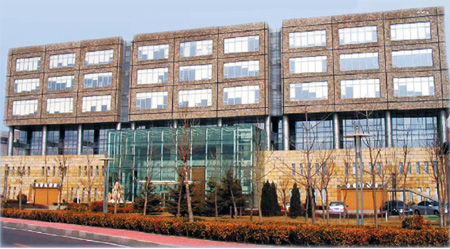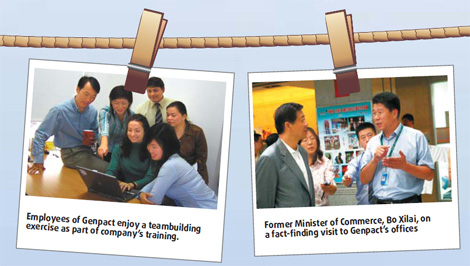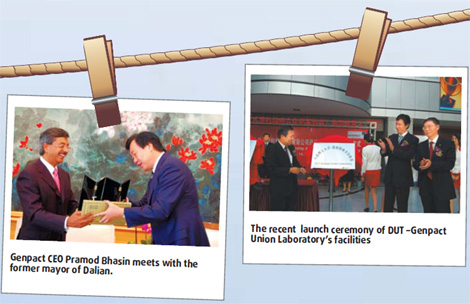Outsourcing: Opportunities and challenges in adversity

Based in Gurgaon, India, Genpact has provided business process outsourcing (BPO) since 1997 and now serves customers from the US, Mexico, UK, Eastern Europe, Philippines, China and India. Pramod Bhasin, president & CEO of Genpact and chairman of the Indian IT industry group NASSCOM, talked with China Daily about the industry.
Q: How do you see the business landscape recovering in Asia?
Pramod Bhasin: China, along with India, represents one of the fastest growing economies of the world. They are redefining trade and power in Asia. Leading organizations from here are closing the gap with the world's largest companies. Businesses here have been rapidly moving up the value chain, enhancing the quality of their products and services and acquiring the capabilities needed to sustain profitable growth across sectors.
But while these economies are important, the emerging economic giants alone do not have the clout to drag the global economy out of one of the worst slump of recent times. China and India have only a marginal impact on the wider global economy because they are exporters with limited domestic demand - ultimately, they are relying on the developed world to recover first before they too can move ahead once more.
The United States, Europe and Japan are the key markets for goods and services provided by these countries - and with low consumer spending showing slow signs of recovery, conditions are not yet conducive to a revival.
However, it is important to state that when we say the US has been hit badly, we do not say that all of the country and all its business are not doing well. Has the mortgage businesses or consumer loan business got hit? Yes. But have healthcare equipment makers or security system manufacturers been hit? No. So there is an overall impact but it's not the same across all business and also not across countries either.
With no organization immune to the impact of the economic crisis, there is renewed focus on running day-to-day operations better than ever, and confront in real-time the challenges and threats unique to this economic crisis. In fact, organizations globally are looking at the downturn as an opportunity to strengthen their marketplace position and outperform competitors.
While no one can predict when market conditions will improve, we do know that positive action now can help companies navigate through these recessionary times.
Q: How has the financial crisis affected your sector?

Pramod Bhasin: The global financial crisis has led companies across geographies to write off losses, merge with other firms or close operations because they are unable to cope with the recession. This has caused abrupt disruption in the industry and it will be hard to regain confidence and trust as bad news continues to ride the news waves. Obviously, this has had tremendous impact on multiple economies around the world and across industries, including the IT/BPO sector.
However, I believe that the short-term and medium-term impact of the current crisis will be limited with respect to the sector. Nevertheless, it may pose a challenge in the long term. It is uncertain how many existing business models will survive. But, the current economic crisis also presents enormous opportunities to our industry which we should seize.
Currently, businesses have taken a hit because BPO/IT companies' dependence on banking and financial services firms in the US is very strong. Small and medium size firms are the ones that have been affected the most by this crisis. For example, according to NASSCOM, the US has a 61 percent share in the Indian BPO export market, making it the largest contributor to exports in the segment. In the current market scenario, this share will go down impacting the growth of Indian IT/BPOs in the short-to-medium term.
This is a structural recession and it will take the industry a few more quarters to cope with a slowing of revenue growth by a few percentage points, but it will also allow companies such as ours to rework their strategies to emerge stronger. Moreover, it will prepare the export-driven software sector to become risk-protected from such uncertainties by penetrating other geographies and expanding its service offerings to diverse verticals to retain its competitive edge and sustain the growth momentum.
This is also a good time for our industry to rethink its business model in light of the new economic realities. We must take a hard look at our cost base and the type of contracts we undertake. Our companies are young and flexible so can change quickly.
Q: In a globalized economy, is your business model facing political pressures - especially at a time like this?
Pramod Bhasin: Political pressures do arise and people are more vocal against jobs moving out. But in order to survive, companies need to restructure and cut costs drastically and the only way they can do it in the current situation is by moving work out to other parts of the world - this is a global supply chain that has been built and will not disappear as our business is delivering something that customers want. However, with growing unemployment rates in the US, we can only expect political angst to grow - but this is not something we are really concerned about as we know that businesses don't have much of a choice in the current scenario.
Q: Will a growing presence in new markets be game changers post the recession?
Pramod Bhasin: No, I don't think so. The recession has happened after 70 years. Upturns and downturns happen, but markets should not be abandoned because of economic cycles. Of course, in the search for growth, new markets must be explored.
Q: How do you see business process outsourcing industry moving in the next five years?
Pramod Bhasin: I think the industry will do pretty well. It is a young, flexible industry and is moving very fast up the value chain. We are increasing the complexities of the services we are offering. The average level of satisfaction among clients is very high. This industry will continue to thrive. To de-risk our business, we thought about diversifying our portfolio so as to be less concentrated on the US market a while ago.
Now we are betting big on the domestic markets in India and China taking off, and that is where many players are focusing now. There is no other industry that has a better medium to long-term potential than ours. Our industry offers one of the most compelling economic propositions to any company - especially in an environment like this.


(China Daily 09/10/2009 page57)








